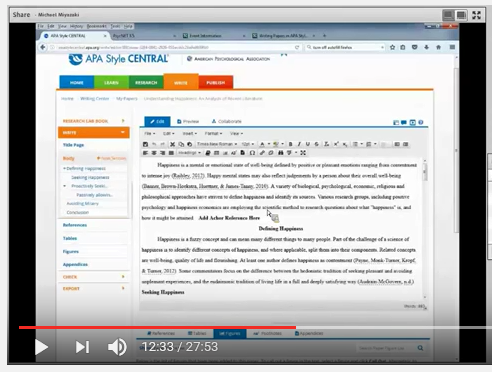The most recent recipient of the APA Librarian Conference Travel Award, Karen N. Reed from the Middle Tennessee State University, used the award to defray the cost of attendance at the Association for Library and Information Science Education (ALISE) conference in January. Alison Cody in APA’s Databases & Electronic Resources Customer Relations group recently talked with her to get her impressions of the conference. The following transcript of their conversation has been lightly edited for clarity and context.
Alison: What are your overall impressions of the ALISE conference?
Karen: I had a wonderful time at ALISE! It was very well-organized, and there were a nice range of session topics to choose from.
Alison: While you were there this year, you presented a paper to a special interest group in your research area. How did that go?
Karen: Yes, I presented a paper to the School Library Media SIG, which is an interest group for educators of K-12 school librarians. I was nervous going in, but was very pleased when it was over and I was able to receive audience feedback. People were very supportive but also asked questions that helped me think of an area for future research. You know, when you’re wrapped up in a research project, the subject matter is so clear to you – getting feedback from others can help you see things in a different light, or question where you were going. All of these ideas from others can only strengthen your work.
Alison: That must have been extremely valuable. Was the feedback useful for the current paper as well?
Karen: Yes, the feedback from my audience regarding my paper was so helpful; I’ve taken that feedback into account in tweaking my paper before I submit it for publication. Also, I was amazed at the individuals who attended my presentation: these were well-known people in my field. In fact, several of the people who spoke to me and gave me feedback were researchers that I had quoted in my paper! In speaking to them, I really had to stifle my fangirl urge to gush and instead try to act professional in talking research. But part of me was thinking “Oh my gosh, I can’t believe I’m talking to so-and-so!”
Alison: What a great experience! What else did you pick up while you were there?
Karen: It was extremely helpful to me to listen to the different presentations and compare their research methodologies. I saw a nice range of ideas, and seeing their practical application to a research scenario gave me much to think about. I am currently writing my dissertation proposal, so it was perfect timing for me to attend this conference and soak in the research designs that have worked for other people.
Alison: It sounds like this was a great conference for you. Who would you recommend ALISE to, and why?
Karen: ALISE is structured towards university library science educators, which is a smaller and more specialized group than the prior librarian conferences I’ve attended such as ACRL. This is a more close-knit group of regulars who seem to know each other and work well together across different institutions. If this is a group that you are interested in meeting with and networking, then I highly encourage this conference.
Alison: I agree! And I’m glad to hear that it was a useful conference for you.
Karen: I am just very grateful to the APA for funding this opportunity. The conference went by very quickly, but I will remember it as a career highlight.
Alison: I’m so glad to hear that! Thank you for taking the time to talk with me today.
Now through March 31, 2016, the APA Librarian Conference Travel Award is accepting applications for conferences taking place from May to August 2017. Please see the website for more details on eligibility, deadlines, and application materials.



